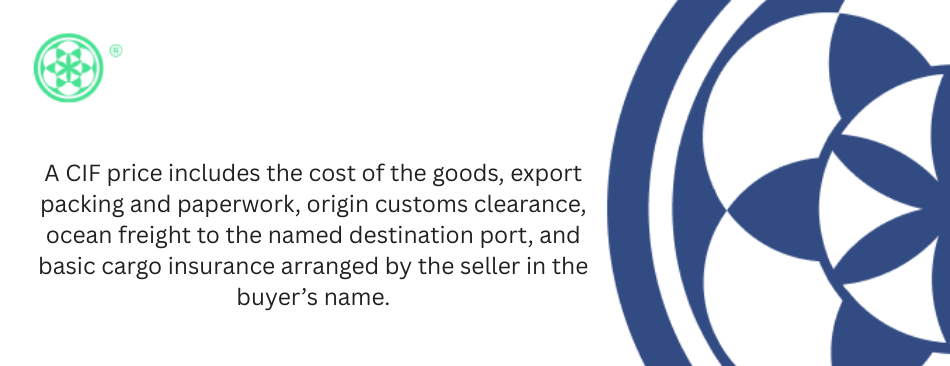Guides
CIF Incoterms explained: meaning, costs, risks, and when to use CIF
TL;DR
CIF (Cost, Insurance, and Freight) means the seller covers ocean freight and basic insurance to the destination port, but the risk shifts to the buyer as soon as the goods are loaded onto the ship at the port of departure.
CIF Incoterm places transport and insurance costs on the seller, while transferring cargo risk to the buyer at the port of shipment.
Key takeaways
- Under CIF, risk transfers early, even though the seller pays for freight and insurance.
- CIF only applies to sea and inland waterway transport, not air, road, or rail.
- The seller must provide minimum cargo insurance, usually under Institute Cargo Clauses C.
- CIF pricing can look simple but often includes built-in freight markups.
- CIF suits smaller importers who want fewer logistics tasks, not those chasing the lowest landed cost.
What does CIF Incoterm mean?
CIF stands for Cost, Insurance, and Freight. It is an Incoterm used only for sea and inland waterway shipping. Under CIF, the seller is responsible for getting the goods onto the vessel, paying the ocean freight to the named destination port, and arranging cargo insurance for the buyer.
What makes CIF confusing is the split between cost and risk. Even though the seller pays for shipping and insurance to the destination port, the risk does not travel with the goods.
The moment the cargo is loaded onto the ship at the port of origin, the risk transfers to the buyer. If anything happens during the ocean voyage, the buyer is the one who must claim against the insurance.
This is why CIF often feels safer than it really is. The seller is paying for the journey, but the buyer carries the exposure for everything that happens after the container is on board.
If you are comparing supplier quotes and want to understand whether CIF is inflating your landed cost, request a CIF vs FOB breakdown before signing the contract.
Who pays for insurance under CIF?
Under CIF, the seller is required to arrange and pay for cargo insurance. This insurance is taken out in the buyer’s name, so the buyer is the one who can make a claim if something goes wrong during the voyage.
The important detail is the level of cover. Incoterms only require the seller to provide minimum insurance, usually based on Institute Cargo Clauses C. This is a very limited form of protection. It typically covers major incidents like vessel accidents or serious physical loss, but it does not protect against many common problems such as theft, rough handling, moisture damage, or delays.
In real-world shipping, that means CIF insurance often leaves big gaps. The buyer technically has insurance, but not the kind that fully protects the value of the cargo. For higher-value or fragile goods, buyers almost always need to buy additional cover on top.
If your cargo is fragile, high-value, or time-sensitive, ask your supplier to upgrade insurance or arrange your own policy.
When does risk transfer in CIF?
Under CIF, risk transfers at the port of shipment, not at the destination. The moment the goods are loaded onto the vessel, the buyer becomes responsible for anything that happens next, even though the seller continues to pay for the ocean freight and insurance.
This is the part that causes the most confusion. Many buyers assume that because the seller is paying for transport to the destination port, the seller also carries the risk until arrival. That is not how CIF works. Cost and risk split at the ship’s rail. From that point forward, delays, damage, loss, or theft are the buyer’s problem, not the seller’s.
This structure means CIF gives buyers convenience, but not protection. You are paying for a prepaid shipment, but you still carry the exposure during the entire ocean voyage.
Is CIF suitable for container shipping?
CIF is widely used for container shipments, but it is not a good fit for how container logistics actually works. The problem is the risk-transfer point. Under CIF, risk is supposed to move from seller to buyer when the goods are loaded onto the vessel.
With containers, cargo is usually handed over to the carrier at a container yard or terminal long before the ship is loaded. That makes it unclear when responsibility really changes hands.
This creates legal and insurance grey zones. If something happens to the container after it is delivered to the terminal but before it is on board the vessel, both sides can end up disputing who is liable. CIF was designed for bulk and break-bulk cargo that is physically lifted onto a ship, not for sealed containers that move through automated terminals.
For containerized shipments, other Incoterms provide clearer protection and fewer disputes. FOB is usually better for port-to-port container moves, while CPT or CIP are more suitable when goods move across multiple transport modes like truck, rail, and sea.
How is CIF different from FOB?
FOB offers more control and cost visibility, while CIF offers simplicity.
If you import regularly, FOB almost always delivers better long-term margins than CIF. Expand to new countries without headaches with Bezos.ai.
What is included in CIF pricing?
A CIF price covers more than just the goods themselves. It bundles together the product cost, export packing, export paperwork, and customs clearance at origin, along with the ocean freight to the named destination port. The seller also includes basic cargo insurance for the voyage, taken out in the buyer’s name.
This is why CIF quotes often look simple. You get one price that appears to take the shipment all the way to your port. But it does not mean the shipment is fully paid for or fully handled at the destination.
What CIF does not include is just as important. The buyer is responsible for import duties and taxes, port and terminal handling fees, unloading, and any inland transport after the container or cargo arrives. These destination-side costs can be significant and are often where unexpected charges appear.
CIF makes the international leg predictable, but it leaves the entire import and last-mile side of the shipment with the buyer.

Can CIF be used for air freight?
No. CIF is only valid for sea and inland waterway transport. It cannot be used for air freight, trucking, or rail. This is written directly into the Incoterms rules and is not optional.
The reason is that CIF is built around the concept of loading goods onto a vessel. That risk-transfer point simply does not exist in air or road transport. Using CIF for air shipments creates legal uncertainty and weakens insurance protection.
For air freight or any multimodal shipment, CIP or CPT should be used instead. Both are designed to work across different types of transport and provide a clear handover point when the goods are delivered to the carrier.
What documents are required for CIF shipping?
The seller must provide:
Always verify the insurance certificate is issued in your company name, not the seller’s. Or let Bezos.ai take care of that for you.
How does CIF affect customs clearance?
Under CIF, the seller handles export customs clearance in the country of origin. That includes export documentation, compliance, and any formalities needed to release the goods for international shipment. Once the cargo is on the vessel, the responsibility shifts to the buyer.
The buyer is fully responsible for import customs clearance at the destination. This includes filing import declarations, paying duties and VAT, and dealing with customs inspections or holds.
One detail that catches many importers off guard is how tax is calculated. In most countries, customs duties and VAT are charged on the CIF value, not just the product price. That means the freight and insurance paid by the seller are added to the taxable amount. Compared to FOB, this often results in higher import taxes, even if the product price is the same.
Advantages and disadvantages of CIF
CIF is one of the most widely used Incoterms in global trade, but it is also one of the most misunderstood. Many buyers assume it means the seller carries responsibility all the way to the destination port, when in reality the risk moves much earlier.
Understanding how CIF splits cost, insurance, and risk is essential if you want to avoid unexpected losses, disputes, or inflated landed costs.
Advantages
CIF keeps things simple for buyers who do not want to manage international shipping themselves. The seller arranges the freight, books the vessel, and provides cargo insurance, so the buyer does not need to coordinate carriers or forwarders. This makes CIF appealing for smaller importers or first-time buyers who want a predictable, all-in price for the ocean leg of the journey.
Because freight and insurance are bundled into the quote, CIF also makes upfront budgeting easier. You know what you will pay to get the goods to your destination port, even if you still need to handle what happens after arrival.
Disadvantages
The biggest downside of CIF is how early risk transfers. Once the goods are loaded onto the vessel, the buyer carries the risk for the entire ocean journey, even though the seller is still paying for the shipping. If something goes wrong, the buyer must claim against the seller’s insurance, which is usually basic and limited.
CIF also gives the buyer very little control over freight costs. Since the seller chooses the carrier and books the shipment, the price often includes hidden margins. On top of that, import duties and VAT are calculated on the CIF value, which includes freight and insurance, so taxes are often higher than under FOB.

Conclusion
CIF offers an easy way to get goods shipped without needing to manage freight or insurance yourself, but that simplicity hides real trade-offs. The buyer takes on risk early, receives only basic insurance, and pays import taxes on a higher value that includes freight and insurance. For small or first-time importers moving bulk goods by sea, CIF can be a practical starting point. As volumes grow and cost control becomes more important, most businesses move toward FOB or CIP to gain clearer pricing, stronger insurance, and better control over their supply chain.
FAQ
Is CIF a good choice for buyers?
It can be, but only for lower-risk shipments where convenience matters more than having full control over shipping and costs.
Who pays duties under CIF?
The buyer always pays import duties, VAT, and any other taxes at the destination.
Is CIF more expensive than FOB?
Often yes. CIF prices usually include built-in freight margins, and customs taxes are calculated on a higher value that includes freight and insurance.
Should I ask for CIF or EXW pricing?
Ask for both. Getting EXW, FOB, and CIF quotes side by side makes it much easier to see where the real costs sit.
What insurance coverage is required under CIF?
Only the minimum level is required. Buyers should arrange additional insurance if the goods are valuable or sensitive to damage.
As a part of the Bezos.ai team, I help e-commerce brands strengthen their fulfilment operations across the UK, Germany, the Netherlands and the US. I work with merchants that want to simplify logistics, reduce costs and expand into new markets. I’m also building my own e-commerce brand, which gives me practical insight into the challenges founders face. In my writing, I share fulfilment strategies, growth lessons and real-world advice drawn from both sides of the industry.












